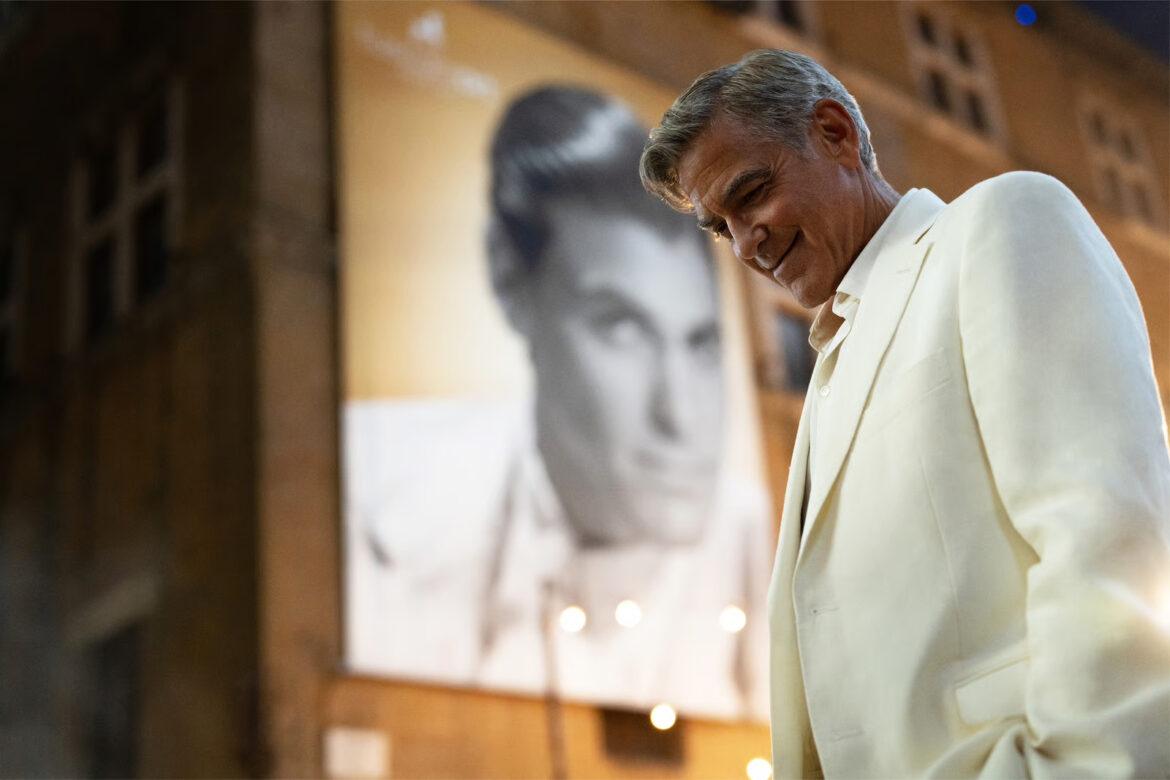Biting cynicism is a hallmark of a Noah Baumbach movie. In the case of Jay Kelly, Baumbach tackles the cynicism of the film industry, or, more specifically, he puts a harsh spotlight on the nature of an A-list acting career that voraciously demands decades of one’s life and self.
So what’s missing from Jay Kelly that is keeping the titular character’s pain from resonating with the audience? Over the course of the film, Baumbach stumbles to make this story bite at the heart, and instead, perhaps with unintentional irony, delivers a hollow portrait of a hollow man.
The film opens with a quote from Sylvia Plath to hold to your chest during the film’s runtime: “It’s a hell of a responsibility to be yourself. It’s much easier to be somebody else or nobody at all.” On one level, it sets the stage for Jay Kelly’s Sartre-esque struggle — the existential fight to define himself beyond the roles he’s played. But the weight of his inner life is never fully realized; sympathizing with him remains a big ask.
After all, it’s hard to admit that you relate to an empty shell of a man. What could have made the character “whole,” according to the story, is being a good father, a steadfast friend, and a devoted son. And, more importantly, being true to himself. It’s just that that might have been Baumbach’s point.
Our first introduction to the character of Jay Kelly occurs as he is filming one of the most dramatic moments of his in-production film. His time on the set wraps as the director calls “cut” off-screen, and, after being swarmed by everyone on set who has a need or ask from him, he finally makes it to the back room of his trailer. He’s exasperated about this man, but his expression is blank; a headshot of Paul Newman hangs on the wall next to his face.
Decades of being compared to the greats can cause a man who beat the odds and was propelled to stardom to lose himself. Are Baumbach and Clooney showing us a man living in a time that isn’t his own? Perhaps — we are, after all, allowed a peek into an intimate moment where Jay Kelly compares himself to Cary Grant and Gary Cooper as he gazes in the mirror. Even the blowup poster of his headshot at a grand tribute in Italy reminds the audience of an Old Hollywood actor’s headshot. Very fitting for someone who felt he was living someone else’s life, informed by flattering sentiments such as “you’re the last of the old movie stars.”
It takes a physical altercation to jolt Jay out of sleepwalking through life, triggering his existential crisis. As we come to learn through flashbacks, times when he turned his back on those he loved are his biggest regrets: piggybacking off of a friend’s audition (which ultimately leads to his breakout role) and refusing to participate in a therapy session with his eldest daughter (which leads to their estrangement). Each memory he revisits in the room where it happened, confronting his remorse head-on, yet even these moments of reflection fail to fully land emotionally.
Perhaps the heartstrings are yanked a bit tighter watching scenes featuring Jay’s agent, Rob, performances that could potentially earn Adam Sandler an Oscar nomination, who grapples with whether or not Jay is “family,” embodying loyalty and the pain of overcommitment. Liz, Jay Kelly’s publicist (Laura Dern), by contrast, represents reality — a mirror reflecting the human cost of Jay’s neglect, trying to see Rob see the reality of his role in Jay’s life clearly. Baumbach opens the door, if they catch on, for the audience to hope that Rob can still stop himself from making the same mistakes Jay has made throughout his life and career.
Even with these strong supporting performances, the story’s heart is often muted. Baumbach asks the audience to feel the weight of Jay’s regrets — the missed opportunities, the estrangements, the “what-ifs” — but the film never fully allows us to inhabit his interior life. The melancholy hovers, heavy and consistent, but never piercing.
Then comes the final line: “Can we go again? I’d like another one.” Jay’s plea is both literal and metaphorical — a desperate request for a redo, a second chance at life. It crystallizes the film’s tension: the yearning to reclaim what was lost, shadowed by the reality that some things can never be undone. Yet even in this moment of clarity, the emotional impact is muted; the audience remains just outside Jay’s hollow heart, watching his heartbreak without truly absorbing it. In the end, Jay Kelly teases a catharsis that never quite comes.
Jay Kelly will be released in select theaters on November 14, 2025, before releasing on Netflix on December 5.
